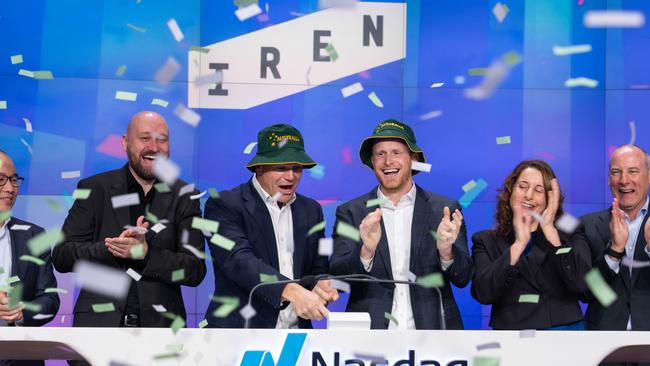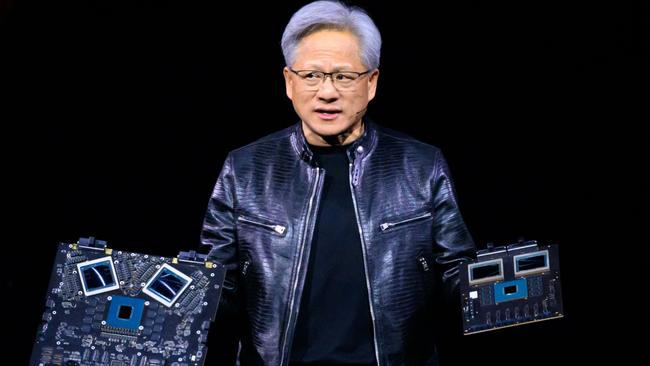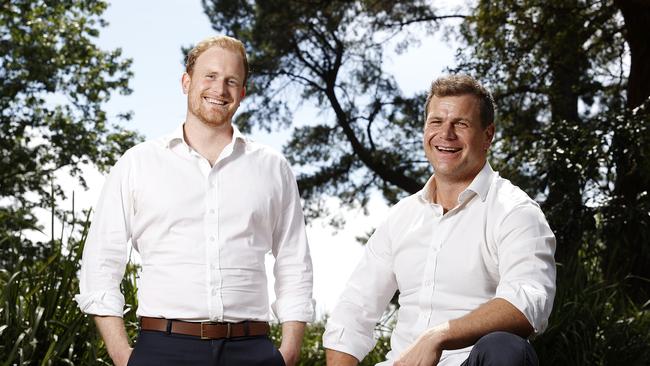Nvidia homes in on end use for its chips as China skirts export bans
Australian-grown bitcoin miner and data centre operator Iren has revealed the complex process to buy Nvidia’s power chips, which are so hot China has found a way to subvert export restrictions.

Australian-grown bitcoin miner and data centre operator Iren has revealed the complex process to buy chips from Nvidia, saying “your money is not necessarily enough” for the world’s hottest company as China finds a way to skirt US export restrictions.
Nvidia, which has a market value of $US2.89 trillion ($4.26 trillion), has projected around $US32.5bn of revenue for its current quarter, topping Wall Street forecasts in a FactSet survey.
Its powerful chips have formed the backbone of the artificial intelligence boom. Chief Executive Jensen Huang says for Nvidia’s Blackwell chips is “incredible” and said that “global data centres are in full throttle to modernise the entire computing stack with accelerated computing and generative AI.”
Iren, which listed on the Nasdaq in 2021, is one of these companies, announcing that it has secured 816 Nvidia H100 chips – which cost about $US25,000 each – with its fleet “fully utilised” by “multiple customers” as it diversifies from bitcoin to capitalise on the AI gold rush.
But buying those chips has not been easy, said Dan Roberts, a former Macquarie banker who founded Iren with his brother Will Roberts.
“The supply chain and the lead time generally was really long. It took many, many months. That seems to have eased up of late as the new generation starts emerging,” Mr Roberts said.
“The other aspect, which was also a challenge initially, was convincing Nvidia to give them to us. Your money is not necessarily enough. You have to get on a phone with them, they interview you and say ‘what are you going to use the chips for?’ Nvida is very focused on the end use case for their chips and to make sure they are being used for reasons they support.
“We had to convince them we were a bona fide operator, had genuine intent and a customer pipeline around these AI scale ups and start-ups. I feel like we’ve now got a really good relationship with them.”

Nvidia is understandably cautious about who they sell their chips too. The Wall Street Journal revealed that Chinese AI developers have found a way to use Nvidia’s most advanced chips without ever bringing them to China, skirting US export controls.
Derek Aw, a former bitcoin miner, is one entrepreneur that has helped Chinese companies overcome export restrictions, loading more than 300 servers with Nvidia chips at a data centre in Brisbane. The Wall Street Journal reported that these servers have been processing AI algorithms for a company in Beijing.
Mr Roberts said he hasn’t heard of such behaviour. “But you’ve just tweaked my mind to what we’re doing and just being aware of it,” he said.
“We know all our customers pretty well, so we’re comfortable it’s not an issue at the moment.”
Poolside is Iren’s biggest AI customer. It is a generative AI company based in Paris that is building tools for accelerating software development.
“ (Iren’s other customers) are just a variety of similar kind of AI scale up start-ups just all trying different ideas, and they need GPUs, and our GPUs are a fraction of the cost of the hyperscalers, so it allows them to manage their cash runway a bit better.”
Iren shares soared almost 15 per cent last Thursday after it delivered its annual results. It later fell 7.2 per cent on Friday, giving it a market value of $US1.5bn.
Its earnings before interest, tax, depreciation and amortisation swung to $US19.6m from a $123.2m loss the previous year. Bitcoin mining revenue surged to a record $US184.1m from $US75.5m. Its burgeoning AI business generated $US3.1m

“We’ve got over $US1bn of equity on the balance sheet, $US400m of cash, zero debt. So at a corporate level, we’re in a bloody good spot,” Mr Roberts said.
“We’re fully funded to grow to 30x of mining capacity. If bitcoin goes up 50 per cent to $US90,000 then all of a sudden you clear in close to half a billion dollars a year in profitability.”
Mr Roberts said Iren also successfully renegotiated contracts with its energy providers, allowing the company to access spot pricing and reduce costs.
Iren spent $US76m on power last year, compared with $US35.8m in the previous 12 months, “primarily driven by an increase in operating hashrate, with 80MW of additional capacity commissioned during the year”.
“Given the size of our expansion, the issue is getting access to spot power. Because when we’ve got access to spot power, the average price in the market might be $US45-50 a megawatt hour, but if you cut out 3-4 per cent of the time intervals, that can drop to like sub $US30. The issue is retailers don’t let you do that because they don’t want to be exposed to a bitcoin miner who can take power when it's $5,000 a megawatt hour,” Mr Roberts said.
“So it results in quite high power costs. In July, this really manifested when the hedge price was just ludicrous. We went to the retailer and said, ‘enough’s enough like we want access to spot’. It all came to a head, and we successfully negotiated it. So our Power Price month to date, we closed out the hedges … has been $31.
“It’s dropping, which means that’s a $US23,000 per Bitcoin cost of power. Market price is $60,000, and that cost will drop further as we expand over the next few months, because we’ve ordered more efficient hardware that’s been installed.”





To join the conversation, please log in. Don't have an account? Register
Join the conversation, you are commenting as Logout